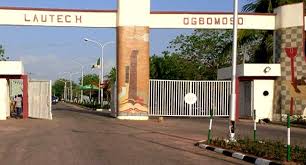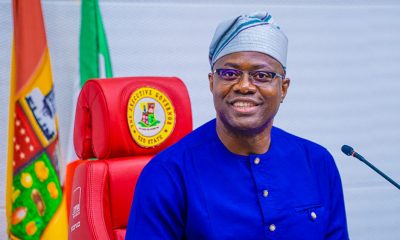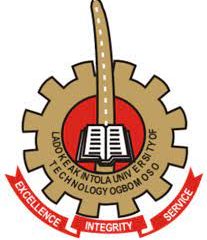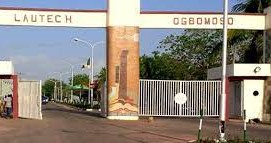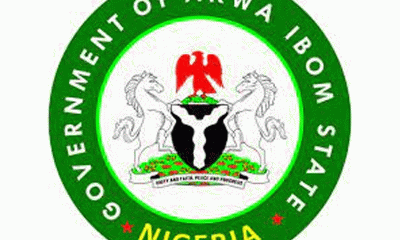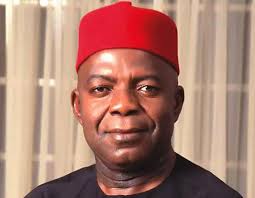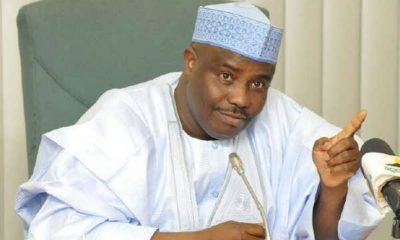Education
LAUTECH Appoints Adewale as Acting Provost, College of Agriculture, Iseyin
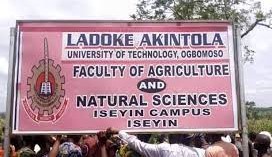
The management of Ladoke Akintola University of Technology (LAUTECH), Ogbomoso, Oyo State, has announced Prof. Gbemiga Adewale as the acting Provost of its College of Agricultural Sciences and Renewable Natural Resources, Iseyin Campus.
Prof. Mojeed Liasu, the Acting Vice-Chancellor, LAUTECH, made this known in a statement made available to newsmen on Thursday in Ibadan.
Adewale was Rector of the Oyo State College of Agriculture and Technology (OYSCATECH), Igboora.
Liasu also announced the appointment of Prof. Lateef Alamu as the acting Dean, Faculty of Renewable Natural Resources.
He said that the appointments of the duo took immediate effect.(NAN)
Education
TETFund Trains 1,000 Students, 15 Staff in Bauchi Varsity
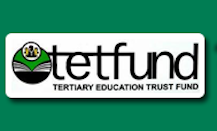
The Tertiary Education Trust Fund (TETFund) on Monday trained 1,000 students and 15 staff members of Sa’adu Zungur University (SAZU), Bauchi, on career development.
Vice Chancellor of the university, Prof. Fatimah Tahir said that the training reflected the institution’s commitment to preparing students for both academic achievement and professional excellence.
The training had the theme: “Empowering Future Professionals: Mastering Career Tools, Building Networks, and Navigating Opportunities.
’’Tahir said that the workshop focused on building the capacity of nominated Faculty Career Officers and dedicated staff who would serve as faculty anchors for future career programmes.
She commended TETFund for supporting the establishment of the university’s Career Service Centre, saying its intervention was transformational in creating sustainable structures for students and alumni career support.
Also speaking, Dr Wasilu Suleman, Director of Human Resource and Career Development, SAZU, described the initiative as a turning point, which placed career development at the heart of academic excellence.
He emphasised their critical role as mentors, facilitators, connectors, and enablers, in helping students discover purpose, build competence, and compete in the modern labour market.
During the sessions, facilitators guided participants on resume and cover letter writing, internship and volunteer placements, mock interviews, and negotiation strategies.
One of the participants, Malam Adamu Ibrahim, said they were expected to be better equipped to navigate career opportunities, strengthen professional networks, and bridge the gap between academic learning and workplace demands.
| ReplyReply allForwardAdd reaction |
Education
Stakeholders Blame Exams Body, Parents over Mass Failure

Stakeholders in the education sector said, the mass failure in the 2025 West Africa Senior Secondary Certificate Examinations (WASSCE) stem from systemic issues attributed to the examination body, parents and the students
The stakeholders spoke in separate interviews in Abuja on Thursday.
Founder, Exam Ethics Marshall International (EEMI), Ike Onyekere faulted the systemic malpractice and deep-rooted corruption within Nigeria’s examination ecosystem.
The West Africa Examination Council (WAEC) had revealed a sharp decline in performance in the 2025 SSE results compared to the previous year.
Out of a total of 1,969,313 candidates who sat for the examination across 23,554 schools, only 754,545 candidates, representing 38.
32 per cent obtained a minimum of five credits, including English Language and Mathematics.Onyechere decried the 38.32 per cent credit pass rate recorded in this year’s examinations as a “very poor result,”
He, however, noted that the decline was not unexpected due to challenges encountered during the exams.
According to him, there were serious logistical issues during the exams such as power outages, poor supervision, and lack of proper oversight which contributed to students’ poor showing.
“I am not surprised because these logistical issues, as critical as they were, they were ignored during and after the exams.
“No person talked about how those kinds of issues should be addressed in terms of how they affected the performance of those students.
“No person talked about what happened after their papers were collected from them, when they did finish their allotted time and when there was no light.
“So these are some of the questions we need to address,” he said.
Onyechere further criticised students’ growing reliance on “magic centres” and malpractice rings, arguing that many students no longer prepare sincerely for their examinations.
He said most of the students have their mind fixed on magic centres, and other forms of malpractices unfettered and with no consequences.
He accused WAEC and its sister examination body of enabling malpractice by repeatedly failing to name and shame individuals and institutions complicit in exam fraud.
“Every year, WAEC releases statements saying schools were involved in malpractices but where are the names? Who are these schools? Who are the supervisors?
“They recycle these supervisors and protect them,” he said
Citing his experience in the Federal Ministry of Education, he alleged that past attempts to publish and blacklist indicted schools and individuals were stifled.
He praised the Joint Admissions and Matriculation Board (JAMB) for its comparative transparency, saying, “at least, JAMB names CBT centres and schools caught in malpractice and takes them to court.
Onyechere admonished WAEC to take cue from JAMB, in addressing the menace of malpractices.
For meaningful change, he called on WAEC to publish names, sanction schools, blacklist corrupt officials, and take concrete action, not just about release of statements.
He also advised students to reject malpractice, rather, discover and develop their true talents.
Also, Dr Jekayinfa Olatunji, a Fellow with the National Mathematical Centre (NMC), called for a national education emergency roundtable, reforms in exam preparation strategies, and closer monitoring of learning standards at all levels.
Olatunji said until tangible solutions are implemented, the futures of millions of Nigerian students would hang in the balance.
“In 2024, no fewer than 1,805,216 students sat for waec exams out of which 1,332,089 students passed at least 5 subjects including English Language and Mathematics at credit level and above, representing 72.12 per cent pass.
“Ordinarily, the results may seem good, but, what about the remaining 27.88 per cent who didn’t get five credits with English Language and Mathematics?
“The students might not have progressed in their education that year.
“Now, the worst has happened in 2025. Out of 1,969,313 students who sat for WASSCE exams, only 38.32 per cent passed five subjects including English Language and Mathematics.
“The remaining 68.68 per cent didn’t pass five subjects including English Language and Mathematics.
“What this means is that only 754,641 students out of 1,969,313 succeeded in having scores that could earn them tertiary institution admissions,” he said
He advised the education stakeholders to take proactive steps to forestall a repeat of the woeful performance in 2026.
Similarly, a civil servant and a parent, Ijeoma Osita, attributed the poor performance in the examination to both students’ attitudes and the role of parents in fostering academic irresponsibility.
Osita decried increasing culture of academic laziness among students and misplaced priorities by parents.
She further lamented that the quality of learning was fast diminishing due to an over-dependence on technology without critical thinking and originality.
According to her, many students no longer commit themselves to studying or building academic discipline, choosing instead to rely heavily on shortcuts such as Artificial Intelligence (AI), examination malpractice, and plagiarism.
“From what I have observed, many students are not ready to go the extra mile to study, build their capacity and equip themselves academically.
“They rely so much on AI and ‘expo’. Unfortunately parents endorse the negative trend, in having their children pass exams.
“They fail to harness the potential in their children by encouraging them to study harder, or even employ extra hands to coach them in the areas of weakness.
“The parents prefer to hire “machinery,” sometimes to write exams for their children.
“Some will even encourage and finance their children to leave the school, where they have attended for years, to register them in ‘miracle centres’,” she said.
She urged parents to take more responsibility in guiding their children, stressing the importance of discipline, hard work and quality education over superficial success.
| ReplyForwardAdd reaction |
Education
WAEC, Education Ministry Resolve Result Glitch Updates Ready in 24 Hours

By Elijah Oguche, Abuja
The Federal Ministry of Education has announced the resolution of a technical issue affecting the 2025 West Africa Senior Secondary Certificate Examinations results.
The issue occurred during post-release processing in subjects where paper serialisation was implemented as part of WAEC’s exam security measures.
A statement by Folasade Boriowo, the director of press of the ministry on Thursday said the Ministry commended the West African Examinations Council for its swift response, transparency, and professionalism in resolving the glitch.
Updated results will be accessible via the result checker portal within the next 24 hours.The Ministry also appreciated the patience of affected candidates and assured the public of its continued pursuit of fairness and credibility in assessment processes.
“This development reinforces the Honourable Minister’s broader education reform agenda, which prioritizes examination integrity across all bodies under the Ministry’s supervision, particularly WAEC and the National Examinations Council (NECO). In line with this, both bodies are set to commence a phased rollout of Computer-Based Testing beginning with objective components in November 2026.
“The adoption of CBT represents a critical step toward curbing malpractice, preventing question leakages, and restoring public trust in the examination system. It is a necessary reform to ensure Nigerian students are assessed strictly on merit and that their certificates retain credibility both locally and internationally.
“Dr. Alausa emphasized that safeguarding the integrity of examinations is not optional—it is essential. Upholding high standards, he noted, protects the future of our young people and sustains Nigeria’s global reputation,” Boriowo stated.

